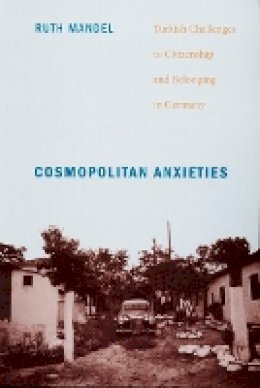Ruth Mandel teaches in the Department of Anthropology at University College, London. She is a coeditor of Markets and Moralities: Ethnographies of Postsocialism.
“[An] extremely intelligent study of Turkish immigration to Berlin. . . . Highly recommended.” - A. A. Caviedes, Choice “Cosmopolitan Anxieties is a fascinating and timely book that makes an important contribution to scholarship on German-Turkish relations, the new Europe, and immigration more broadly. It will be of great interest to scholars in these fields and to anyone interested in contemporary German society.” - Melissa L. Caldwell, European Journal of Sociology “Cosmopolitan Anxieties is a vividly written ethnography that will attract readers who are interested in Turks and immigration politics in Germany, as well as the intercultural facets of Berlin. The multilayered study of belonging brings to our attention how Turkish guest workers in Germany are socially constructed as foreigners rather than immigrants or citizens. Therefore, this study clearly has an applied dimension. If policy makers read such analyses, they would more easily grasp the reasons why their current integration policy for ‘foreigners’ is bound to fail.” - Refika SarıÖnder, Current Anthropology “This is a remarkable study which not only provides scholars in the fields of race and ethnicity, European studies and anthropology with real insights into the complexities and challenges facing Germany’s Turkish community, but also makes a disadvantaged community more visible.” - Daniel Faas, Ethnic and Migration Studies “In Cosmopolitan Anxieties, Ruth Mandel successfully conveys the particularities of Turkish experience in the German milieu as she moves across a variety of topics, including citizenship, cultural identity, religion, transnationalism, urbanism, and racism.”-Kevin Robins, author of The Challenge of Transcultural Diversities: Cultural Policy and Cultural Diversity “Ruth Mandel has turned the long trajectory of her journey through the jostling identities of Turk, Muslim, Alevi, German, Jew, and American-often introspective, always nuanced, and richly painted with intense, intimate, and many-hued detail-into an intricate and yet lucid masterpiece of analytic as well as ethnographic dexterity. In the condescension of a well-meaning Berlin cultural elite toward the ‘demotic cosmopolitanism’ of the immigrants, and in the scream of irrepressible disgust evoked by the touch of an alien-seeming strand of hair, she gracefully but inexorably traces the lingering miasma of submerged or weakly confronted intolerance and challenges us to search out its traces in our own cultural milieu as well.”-Michael Herzfeld, author of The Body Impolitic: Artisans and Artifice in the Global Hierarchy of Value “Ruth Mandel’s study of the Turks of Germany is perhaps the most important single book yet written examining the complexity and contradictions of the Muslims in today’s Europe. Looking at the various communities (Turks, Alevis, and Kurds) that make up the Turkish presence in Germany and delineating the complexity of a German identity after the Shoah and German reunification as the background to the debates about these Islamic presences, Mandel is able to provide first-hand, sophisticated answers to the most troubling questions about the shifting world of Islam in Europe. A study that will quickly become a classic for any examination of Europe and Islam.”-Sander L. Gilman, author of Multiculturalism and the Jews “Cosmopolitan Anxieties is a fascinating and timely book that makes an important contribution to scholarship on German-Turkish relations, the new Europe, and immigration more broadly. It will be of great interest to scholars in these fields and to anyone interested in contemporary German society.” - Melissa L. Caldwell (European Journal of Sociology) “Cosmopolitan Anxieties is a vividly written ethnography that will attract readers who are interested in Turks and immigration politics in Germany, as well as the intercultural facets of Berlin. The multilayered study of belonging brings to our attention how Turkish guest workers in Germany are socially constructed as foreigners rather than immigrants or citizens. Therefore, this study clearly has an applied dimension. If policy makers read such analyses, they would more easily grasp the reasons why their current integration policy for ‘foreigners’ is bound to fail.” - Refika Sarıönder (Current Anthropology) “[An] extremely intelligent study of Turkish immigration to Berlin. . . . Highly recommended.” - A. A. Caviedes (Choice) “This is a remarkable study which not only provides scholars in the fields of race and ethnicity, European studies and anthropology with real insights into the complexities and challenges facing Germany’s Turkish community, but also makes a disadvantaged community more visible.” - Daniel Faas (Ethnic and Migration Studies)

